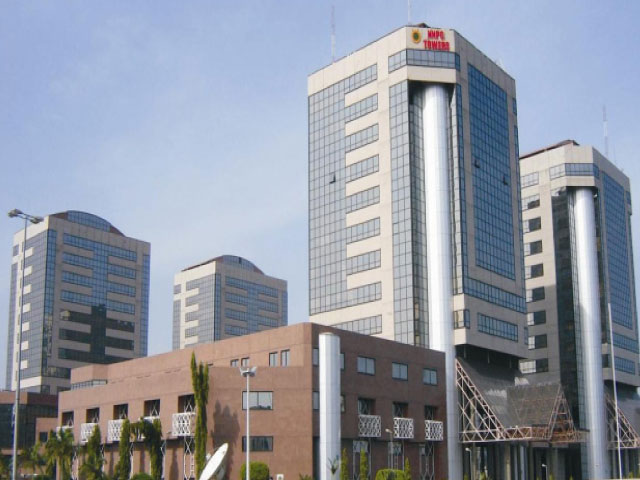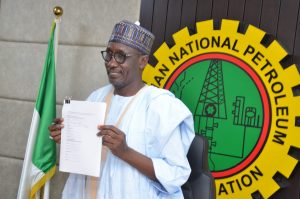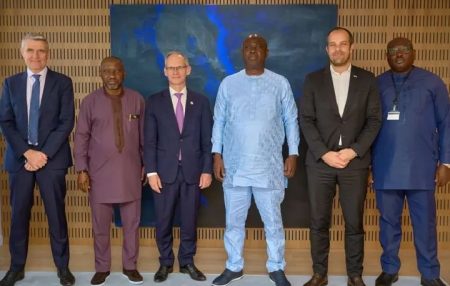*To operate with 20% of profits *80% goes to shareholders *IPMAN faults move over state of local refineries

Chuks Isiwu & Mkpoikana Udoma
Lagos/Port Harcourt — There are high expectations from stakeholders in the oil and gas sector for NNPC Limited – the new firm that succeeded the former state oil company, the Nigerian National Petroleum Corporation, NNPC.
Indeed, cautious optimism and doubts greeted the recent Federal Government action that transited the NNPC from a public corporation to a limited liability company. While some operators, industry watchers and general observers believed the move was the right way to go in trying to entrench the NNPC on the path of profitability and overall success, others rather called for caution.
Turning the former wholly government-owned entity to a limited liability company is one of the provisions of the Petroleum Industry Act, PIA, which came into effect last year. As prescribed by the Act, NNPC on July 1, 2022, legally transformed to a company to be regulated under the Companies and Allied Matters Act, CAMA.
With the development, the NNPC becomes a commercialised company, running on its own steam and answerable to a board and shareholders.
The commercialisation implies that the NNPC will buy crude to refine just like every other refinery in the country, like Waltersmith and NDPR refineries, unlike before where it was operating on behalf of the Federal Government.
NNPC Ltd will no longer represent the Federal Government in Joint Venture operations with oil operators, both oil multinationals, indigenous and independent producers, however, another entity is expected to handle that aspect.
Announcing the change of status for the multi-subsidiary company, President Muhammadu Buhari said the Nigerian National Petroleum Company Limited or NNPC Limited would no longer remit any money to the Federation Accounts Allocation Committee, FAAC, for sharing to the three tiers of government. He also said NNPC Limited, even though an offshoot of the old NNPC, currently owed no money to FAAC, as all monetary arrears to the committee were owed by the old corporation and not the new oil company.
According to President Buhari, the oil company would henceforth operate under best international business practice unlike the old order, where NNPC was opaque, lacking in transparency and accountability.
Speaking on the development, the Managing Director, and Chief Executive Officer of NNPC Limited, Mele Kyari, said: “We are now a private company… we will pay our taxes, royalties and deliver dividends to our shareholders.”
0% of profits for shareholders, 20% for company operations
It was gathered that the new NNPC Limited would retain 20 per cent of its annual profits for its operations while the balance 80 percent would go to its shareholders.

Giving more information on the new NNPC Limited, Kyari, who was the Group Managing Director of the old NNPC, said: “You now have a smarter, more responsive and much more accountable company that must act within the premises of all regulations that are in Nigeria for private companies,
“It must also meet the standards of best practice in every industry in terms of governance, complying with regulations and beyond these, eyes are on the ball that your shareholders are expecting you to deliver value to them.
“That value must translate in two forms. One is that they must see dividends and the second part is that you must deliver energy in this country. This company is now in a position to do both of them because it is now a nimble company, can act, borrow and return peoples’ money quickly.
“I am sure Nigerians will see a very different company in the coming days and months. And we are convinced that by the mid of next year this company will be IPO ready.”
Kyari explained that when he said the company was “IPO ready”, he meant that the company has systems and processes lined up on the side of profitability and is a company that is accountable to its shareholders and stakeholders. “Simply put, that is what IPO processes look for; to see that you have the assets. Today government has transferred those assets to NNPC and we have very ample assets that nobody has in this country and, of course, not even in Africa,” he stated.
Fuel subsidy
Under the new arrangement, fuel subsidy is no longer NNPC’s burden. Said the NNPC Limited CEO: “Subsidy is the decision of the state and in every jurisdiction anywhere in the world, countries see them differently. In some countries, they put petroleum tax on top of the market price of these products.
“So, when decisions are to be made in some jurisdictions, they will reduce the level of taxation. That also is another form of subsidy. In some countries, you have zero taxation, but you will pay the market price for the commodity. That also in a way, in a fiscal system, looks at it from a subsidy point of view.
“In very many countries, a leader can decide that I don’t even want my countrymen to buy it at the market price. I’m ready to reduce that price for them so that they can buy.”
“So, it is no longer an NNPC issue. NNPC will have no issue with this. NNPC will be happy to supply because we will now see the state as our customer,” he added.
Speaking on the staffing of the new entity, he allayed fears of job losses due to the NNPC transition to a private firm, He said the total number of staff of the NNPC was 7,000, adding that rather than sack workers, more people would be employed due to the expansion plan of the new organisation. “The law has also provided that no one is going to leave this company. Everybody’s work is preserved, their benefits are preserved. So. there is no matter of concern for the employees of this company,” he explained.
Meanwhile, industry stakeholders have expressed both optimism and caution over the development. Many believe that the new NNPC must be ready to truly operate like a private sector-driven entity with profit as a major target.
An industry watcher, Mr Gordian Ezeanyibo, said the positive aspect of the latest development is that it would entrench transparency and curb corruption in the system. “Definitely, a good development as it will bring about transparency. NNPC, as we have known it, has eternally been seen as a home of corruption. There has always been this continued controversy over FAAC allocation. As far as many people are concerned, NNPC always has questions to answer. Everything about the corporation is shrouded in mystery. Hopefully, with the latest development, transparency and accountability will reign,” he said.
Dr Oladiran Fawibe, Group Chairman/CEO, International Energy Services Limited, said the transition of the old NNPC to NNPC Limited was a step in the right direction and that it would be great to see the company perform to the best of its ability. Fawibe, who spoke further on the implications of NNPC transiting to a limited liability company, stated that like all companies in that category, NNPC Limited would be answerable to shareholders. He disclosed that of the company’s annual profits, 80 per cent would go to shareholders with the company retaining 20 percent to grow its operations.
”NNPC Limited has to make profits and not incur losses. Assets have to be operated profitably,” he told Arise Television.
He maintained that NNPC going cap in hand to the Federal Government to beg for funds constrained its operations and identified government interference as the biggest challenge to the oil corporation. He stated that with the latest development, NNPC Limited should be able to operate optimally.
But another observer, who simply identified himself as KBE, said nothing has changed between the old NNPC and NNPC Limited.
“Nothing has changed – the same board, the same management team. Who appointed the board? Who put the team leading the ‘private’ company together? The President has no right to appoint and approve the board and management team of a truly private company.
“You (we) were told the owners are federal ministry of finance ‘limited’ and other ministrieson behalf of federal, states and local governments of Nigeria. Who is the federal ministry of finance ‘limited’. That is a fraud and another gimmick to steal.
“If it’s a private company, a body with oversight function should be responsible for the appointment of personnel for the running of the company. The President did the appointment. He merely transitioned his former appointees to the new board and management team,” he argued.
He maintained that for NNPC Limited to be truly private, it should be taken away from the government, stressing: “Government should not be the one appointing the board and the management team for the NNPC.”
However, another observer, who identified himself as Yinka, called for patience on the part of Nigerians. He said: “NNPC Limited is modelled after Aramco of Saudi Arabia, which has largest assets and is richest company in the world. NNPC Limited is still going through transition and another management team can take over after completion of the transition. Nigerians need to be patient and allow the process to be completed.”
NNPC Limited must be independent
The Independent Petroleum Marketers Association of Nigeria, IPMAN, believe that the new oil company can only make progress if it is allowed to operate independently, otherwise not much change should be expected.
IPMAN Chairman in Rivers State, Dr. Joseph Obele, said NNPC Ltd as a profit -making venture would not involve itself in ventures that would make them run at a loss, just like the multinational oil companies Shell, TotalEnergies and others.
“There will be boom in the industry especially with Dangote refinery coming on stream next year. If it will be independent, then it will be a welcome development but if the finger of the federal government will still be there then we shouldn’t expect much.
“Employment at NNPC has never been on the basis of productivity but federal character. Over 10,000 persons nationwide are employed in NNPC for jobs experts believe can be done with less than 2,000 persons. This means that over 8,000 persons will lose their jobs, if NNPC Ltd must be efficient.
“My reservation is that the government should only have a stake just like they have in NLNG, Indorama Petrochemicals, Notore Fertilizers etc, because for the government to still have the right to appoint the head of the company means that it is not entirely privatised.
“The federal government will no longer bear the losses of NNPC. NNPC Ltd would run like SPDC and Agip but government will still appoint the CEO which is what we are against. We are saying that it should be privatised completely
“The host communities will benefit so much because employment will no longer be done in Abuja under quota system and federal character but on the basis of competence,” he said.
Also, a business analyst, Mr. Ignatius Chukwu, believes the commercialisation of NNPC was coming too late, as other oil producing countries have milked the industry and have used this system to develop alternative energy sources and boost industrialisation.
Chukwu, a retired business news editor, said the new NNPC Ltd should be made to run fast, in order, to achieve the benefits of the hydrocarbon industry, especially in the downstream sector, gas and petrochemicals sector.
“Going public means that it will be owned by anybody that wants to buy equity (shares) in it. It is a state-owned enterprise, limiting the equity would not give all Nigerians equal access to the equity units. It is going to be owned by shareholders, not just by its director.”
For a labour leader and former Chairman of PENGASSAN, Port Harcourt Zone, Comrade Azubuike Azubuike, the commercialisation of NNPC is a welcome development that can always be made better over time, adding that the legislature can always ensure checks and balances to keep the company on track.
“It is a welcome development. Even if it doesn’t get done well it is better, we start and then make corrections along the line than never start at all. It will be run like any other oil company as a business venture, for profit maximisation and to make the corporation efficient and competitive.”
On the involvement of government in the new entity, Azubuike explained that just like Petrobras of Brazil and Gazprom of Russia, it will be difficult to totally remove the government from NNPC Ltd.
But a stakeholder and Executive Director of Youths and Advocacy Centre, Mr Fyneface Dumnamene Fyneface, cautioned that if political interference, bureaucracy, and government influence are not removed to ensure that the company is managed by professionals, the goal of making it a private limited company will not be achieved.
Fyneface said that there should be much retrenchment and early retirement of staff who have been hiding under the umbrella of NNPC as a government parastatal.
He said: “YEAC believes that the commercialisation of the NNPC is a welcome development to the extent that it lives up to its mandate and expectations of Nigerians. The NNPC must purge itself of those things that made it fail Nigerians as a corporation. It is obvious that the conception of the idea of reorganising the NNPC into a limited liability company through enabling law as the PIA was because the corporation was not living up to its expectations.
”So, while the NNPC remains an old wine in a new bottle, high-level of results and accountability are expected in line with the legal framework of its establishment, demands and the needs of the Nigerian people.”
However, the Movement for the Survival of Ogoni People, believes that the commercialisation of NNPC is another jamboree to foster the grip on oil producing communities and stifle the increasing demand for fairness in resource allocation from the government.
President of MOSOP, Mr. Fegalo Nsuke, believes there will be no significant difference, while hoping that the PIA which birthed NNPC Ltd will be reviewed overtime to accommodate and address unfair allocation for host communities and address the issues of how the allocation is used.
“The ownership is still with the government’s ministries of petroleum and finance. So, in the real sense, the NNPC is not actually private.
He stated: “First, it places heavy limitations on the clamour for justice in resource allocation by making the activities of the NNPC and the sustenance of the lopsided revenue allocation practice a statutory law. Imagine a law compelling a supposed private firm to invest in oil exploration in the frontier basin. If the NNPC Ltd was truly private, such a decision should have been taken by its management based on profitability and risk involved. But here, it is a directive by the provisions of the PIA and that could really be a drainpipe.
“I think funds should be committed to building infrastructure, advancing the security of the state and creating jobs rather than just paying individuals and the allocations make no real difference in the quality of life.”
Implications of NNPC commercialisation on its finances
The NNPC Ltd is expected to operate without government financial interventions, but to source for funds on its own to make investments, make profits and pay tax and royalties to the government, just like every other company.
A business analyst, Mr Ignatius Chukwu said: “The first implication is that it would have access to larger capital base with which to trade. It will not get capital by loans alone but through cheap system by selling shares and paying dividend instead of interest”.
The labour leader and former Chairman of PENGASSAN in the Port Harcourt Zone, Comrade Azubuike, said: “Their books will be open. Shareholders will see details of their account. Their account will be audited and made public.”
IPMAN faults commercialisation over non-producing refineries
IPMAN faulted the commercialisation of the NNPC, saying the timing was very wrong, owing to the prevailing economic condition in the country.

IPMAN explained that the federal government should have put the nation’s four refineries to function in optimal capacity before commercialising NNPC, saying that the landing cost of the premium motor spirit, PMS, also known as petrol, was already at N470 per litre.
IPMAN Chairman in Rivers State, Dr Obele, said if the four refineries were working, Nigerians would buy PMS at less than N80 per litre, but would now be at the mercy of the prevailing PMS prices at the international market.
Obele said the union was not against the commercialisation, but the timing and that the government did not consider the poor masses, as the commercialisation of NNPC will add to the untold economic hardship in the country.
He calculated that the Automotive Gas Oil, AGO, or diesel, will sell at N1,000 per litre and PMS at N500 per litre at the international market between now and December 2022, warning that it would be a tough time for Nigerians as it concerns the oil and gas sector globally.
“NNPC will no longer enjoy subsidy from federal government again and Nigerians will be buying fuel at the rate it’s being sold at the international market.
“What we, as critical stakeholders, are worried about is the timing, this is coming at the wrong time; reason being that the four refineries are not working, and we are importing refined petroleum products from the international market.
“If our refineries are working, Nigerians will be buying PMS at less that N80 per litre. Following the prevailing economic condition in the country it is a wrong time to bring upon Nigerians another hardship. This is a wrong time for them to do this,” he said.
He added: “Declaring NNPC as a public limited company away from the government venture that it used to be is simply a wrong timing.
“We are against the timing; it’s coming at the wrong time because our refineries are not working. If the refineries were working, Nigerians will be buying PMS at less than N80 per litre.
“We are relying on the international market and dollars is currently exchanging at over N600.”
Follow us on twitter



